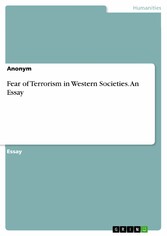Fear of Terrorism in Western Societies. An Essay
von: anonymus
GRIN Verlag , 2021
ISBN: 9783346357748
, 8 Seiten
Format: PDF
Kopierschutz: frei
Preis: 5,99 EUR
eBook anfordern 
Mehr zum Inhalt

Fear of Terrorism in Western Societies. An Essay
Essay from the year 2021 in the subject Sociology - Miscellaneous, grade: 1,0, University of Wroc?aw, language: English, abstract: This essay deals with a culture of fear in the West, which provides a perfect breeding ground for the fear of terrorism. Terrorism is a global phenomenon and omnipresent in Western societies, such as the European Union or the United States. The goal of terrorism is to produce a climate of fear and to disrupt the social cohesion. Since the attacks on the World Trade Center on 11 September 2001, terrorism has been attracting more and more attention within Western society and their mass media. It gave rise to a universal awareness of vulnerability of the West (Beck, 2009, p. 14). After Islamic terrorist attacks on Germany and France in 2015 (Charlie Hebdo attack, Bataclan attack, Berlin attack), 44% of the people surveyed stated that terrorism was the greatest threat within the European Union, according to Eurobarometer 87 in the following spring (Eurobarometer, 2017). In the United States, the public concern about Islamic terrorism was even higher, half of the US population were worried about themselves or a family member becoming the victim of terrorism after the attacks (OWD, 2019). These surveys illustrate that terrorism is perceived by the Western public as a major threat to social life. In this essay I will argue that we have established a culture of fear in the West, which provides a perfect breeding ground for the fear of terrorism. Terrorism in fact is dangerous, but my point is that the danger is massively exaggerated, and we fear the wrong things. I will deal with the culture of fear and how it influences the perception of risk in terms of terrorism. Furthermore, I argue that media and terror maintain a symbiotic relationship that benefits from each other and this leads to a reinforced distortion of perception in the public. The excessive coverage of terrorism in the mass media is disproportionate to the numbers of death and leads to a staged threat. To put it in the words of Ulrich Beck: 'Whether it be the mass media broadcasting the images of bloodstained victims across the world, or American President Bush declaring war on terrorism, or NATO declaring a case of legitimate defence after 9/11: only when such reactions follow the deed does every terrorist's dream of a meteoric rise from obscure petty criminality to the 'number one enemy', the 'global danger' - in short, to 'terrorist world stardom' - become a reality.' (Beck, 2009).









